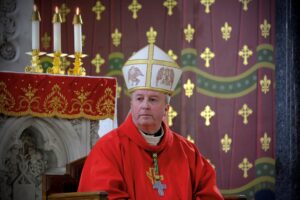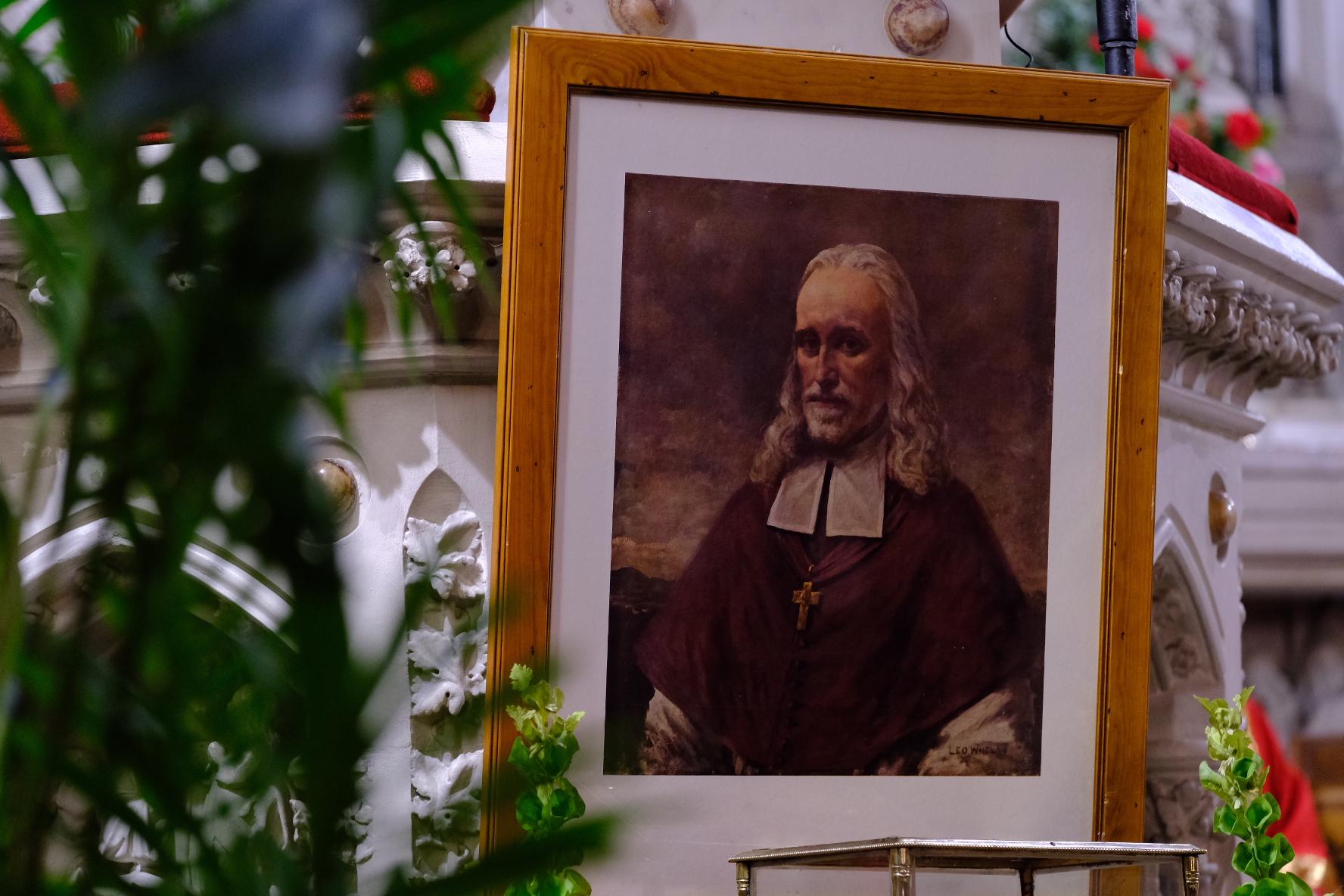Bishop Michael Router’s Homily on the 50th Anniversary of the Canonisation of St. Oliver Plunkett
St. Peter’s Church, Drogheda, Sunday 12th October 2025
Text of Bishop Michael’s Homily

Saint Paul tells us in today’s second reading that preaching Christ can mean imprisonment and chains for the preacher, but “the word of God is not chained.” St. Oliver Plunkett knew this truth well during his life. As archbishop he confirmed thousands, rebuilt discipline in the diocese, settled conflicts, and then, falsely accused, was dragged from Ireland to London, condemned and executed. His hands were chained but his heart and mind was not. Like Paul, he endured his suffering for the sake of the faithful, so that others might obtain “the salvation that is in Christ Jesus, with eternal glory”
After St. Olivers conviction on fabricated charges and his martyrdom at Tyburn in 1681, his name faded from public memory here in Ireland. Yet the light of his memory was kept burning in small but significant ways. Here in Drogheda’s Siena convent, in the Irish College in Rome, among Benedictine communities in England and Germany he was never forgotten until, in 1886, Pope Leo XIII declared him Venerable. This reawakened and renewed interest in him, and his story. Studies confirmed his exemplary character and his death for the faith. In 1920, in the middle of the turmoil of our War of Independence, Pope Benedict XV beatified him and his devotion blossomed among a people longing for peace. His feast day the following year was celebrated just as the Truce of July 1921 took effect. Many people took that timing as providential encouragement to keep praying and to keep hoping for a better future for Ireland.
In 1958 a sign was received that opened the door to canonisation for Oliver. Far away in Naples, an Italian mother, Giovanna Martiriggiano, whose surname incredibly is derived from the Italian word for Martyr, was at the point of death, and effectively given no hope by her doctors, after the loss of her child. Through the night her husband prayed with Sr Cabrini Quigley of the Medical Missionaries of Mary, another connection with Drogheda, invoking Blessed Oliver. Against all expectation, she revived and made a full recovery without further intervention. Panels of independent doctors examined the case and eventually the Church judged it a miracle through Oliver’s intercession. Years later, Giovanna participated in the offertory procession at the canonisation itself.
In the Holy Year of 1975, during some of the darkest days of the Troubles, Paul VI canonised Oliver Plunkett and, from the heart of the Church, spoke to Ireland asking us to let the message of peace and reconciliation be emblazoned on our hearts. That is why, ever since, we invoke St. Oliver as patron of peace and reconciliation in this land.
As the Holy Father said in his address that day: “In St. Oliver Plunkett’s pastoral activities, his exhortation had been one of pardon and peace … he would not compromise with truth or condone violence: he would not substitute another gospel for the Gospel of peace. And his witness is alive today in the Church, as he insists with the Apostle Peter: Never pay back one wrong with another … From Jesus himself he had learned to pray for his persecutors and with Jesus he could say: Father, forgive them.”
Ireland has received many gifts through Oliver’s intercession, moments of ceasefire, steps toward dialogue, an unflagging witness that forgiveness is stronger than hatred. On this anniversary we return, like the grateful Samaritan in the gospel today, to fall at Jesus’ feet and say: thank you. Thank you for providing us with such a shepherd whose blood watered the seeds of peace in our soil.
In the decades that followed his canonisation, devotion at this shrine drew pilgrims to pray for what politics alone struggled to deliver. The long path to the Good Friday Agreement was walked, however imperfectly, in the spirit the Oliver embodied himself: courage, patience, and forgiveness.
The peace that St. Oliver and so many like him have strove for over the centuries is not to be taken for granted. It has to be constantly worked at and renewed by being honest in all our dealings, respecting the dignity of others, and choosing mercy when it would be easier to strike back.
What then can we do to keep the legacy of St. Oliver alive? The Gospel today gives us two suggestions. Firstly, always keep returning to Jesus with thanks. Come to him in the Eucharist naming the ways you see God at work in your family, parish, and even in your most challenging and difficult moments. Gratitude for what is good and wholesome in our life changes the way we think, speak and act and magnifies the positive.
Secondly, accept the cost of being faithful. Our witness to God through word and example is not always welcome, particularly when we are witnessing to the sacredness of life and defending the poor and vulnerable. To repeat what St. Paul tells us today, “the word of God is not chained.” When dialogue breaks down, when suspicion and distrust rises, when old negativity returns, choose to keep talking, keep praying, and keep building. Ask Saint Oliver to help you be just and fair, especially in dealing with those you find hardest to love.
Finally, remember that God’s work is evident in ordinary people who keep saying yes to his prompting in their lives. On this fiftieth anniversary of his canonisation, we entrust Ireland again to Saint Oliver Plunkett, martyr, pastor, and servant of peace. An anniversary, like today’s, is not just about the past, about history. The Church here, and throughout western Europe faces real challenges, fatigue, confusion, and many competing voices in these difficult times. The answer is not nostalgia. It is renewed discipleship. We need new Olivers to emerge in this parish and country to work to re-kindle the faith where it has withered and died. May St. Oliver pray for us, so that we endure with Christ, and do our part to establish his kingdom on earth.
+Bishop Michael Router
Auxiliary Bishop of Armagh



